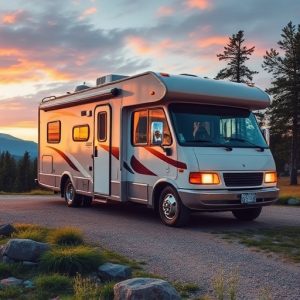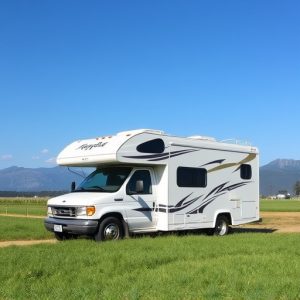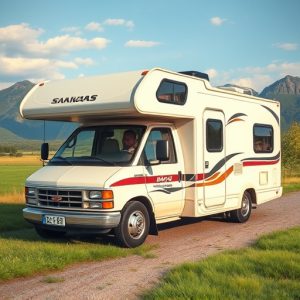Mastering RV Travel Safety: Top Gear and Tips for Secure Adventures
Embarking on an RV travel adventure requires diligent preparation and adherence to safety protocols…….

Embarking on an RV travel adventure requires diligent preparation and adherence to safety protocols to ensure a secure and enjoyable experience. Essential RV travel tips include proactive maintenance checks before departure, such as inspecting brakes, tires, lights, and propane systems. It's crucial to understand your RV's load capacity to prevent overloading, which can lead to tire blowouts or structural damage. Select camping spots that are safe and suitable for your RV's size and weight to avoid high traffic areas and potential hazards. Always keep fire extinguishers on hand and regularly test smoke and carbon monoxide detectors to guard against gas leaks and fires, with special attention to the silent threat of carbon monoxide poisoning. Securing valuables and maintaining well-stocked emergency kits are prudent measures for unforeseen circumstances. Implementing robust fire safety measures by owning and knowing how to use appropriate fire extinguishers is essential, as is having CO detectors strategically placed within the RV. Additionally, securing your RV with high-quality latches, sturdy locking systems like Camlocks, and possibly advanced security systems with motion sensors and remote monitoring capabilities will enhance security. Adapting driving habits to account for the RV's size and handling characteristics is necessary, along with using accessories that improve safety and comfort, such as mirrors, backup cameras, and travel pillows. Finally, ensuring you have up-to-date RV insurance provides financial protection against unforeseen events during your travels. Following these RV travel tips will significantly enhance the safety and enjoyment of your journey on the road.
Embarking on an RV travel adventure offers a blend of comfort and exploration, making it a popular choice for intrepid wanderers. Ensuring safety throughout this journey is paramount, as it combines elements of both home and the open road. This article delves into the essential safety gear for RV travelers, ensuring your voyage remains secure and enjoyable. From mastering RV Travel Tips to outfitting your vehicle with high-quality fire extinguishers and robust carbon monoxide detectors, we cover everything you need to know to navigate confidently. We’ll also guide you through selecting top-rated safety latches, and provide driving tips alongside indispensable accessories for a smooth and secure RV road trip experience. Safeguard your travels with our comprehensive guide tailored for the discerning RV explorer.
- Understanding the Essentials of RV Travel Safety
- Comprehensive Guide to High-Quality RV Fire Extinguishers and Their Placement
- The Importance of Carbon Monoxide Detectors in RVs: Prevention and Protocols
- Securing Your RV: A Review of Top-Rated Safety Latches and Locking Systems
- Navigating Safely: Essential Driving Tips for RV Road Trips and Must-Have Accessories
Understanding the Essentials of RV Travel Safety

When embarking on RV travel adventures, prioritizing safety is paramount to ensure a comfortable and secure journey. The open road presents unique challenges that require specific RV travel tips to address them effectively. Firstly, it’s crucial to conduct pre-trip inspections of your RV to confirm that all systems, including brakes, tires, lights, and propane gas, are functioning correctly. Regular maintenance checks can prevent potential issues on the road. Additionally, understanding the load capacity of your RV is essential to avoid overloading, which can lead to tire blowouts or structural damage.
Safety extends beyond the vehicle itself; it also encompasses the surroundings and activities while RVing. Always select safe camping spots away from high traffic areas, considering the terrain’s suitability for your RV’s size and weight. Keep fire extinguishers accessible and ensure carbon monoxide detectors and smoke alarms are in working order to safeguard against gas leaks or fires. Carbon monoxide poisoning is a silent danger, so installing and testing CO detectors should be part of your RV travel tips checklist. Furthermore, secure all belongings to prevent theft and ensure that emergency kits are fully stocked with first aid supplies, water, non-perishable food, and necessary medications. By adhering to these RV travel tips, you can enhance the safety of your journey, allowing you to focus on the pleasures of the road ahead.
Comprehensive Guide to High-Quality RV Fire Extinguishers and Their Placement

When embarking on RV travel, safety should be a top priority, and having a high-quality fire extinguisher is a crucial component of your preparedness kit. A comprehensive guide to selecting the right fire extinguisher for your RV involves understanding the different types available—dry chemical, CO2, foam, or wet chemical—and choosing one that suits the potential fires you might encounter within an RV. Dry chemical extinguishers are versatile and effective for most combustible fires, while wet chemical extinguishers are specifically designed for Class F fires involving cooking oils and fats. Ensure you understand the classification of fires (A, B, C, D, and K) to select an extinguisher that addresses the types of fuels likely to be found in an RV setting.
Placement is as important as selection when it comes to fire safety in an RV. A minimum of two ABC-rated fire extinguishers should be installed, one near the entry door and another in the kitchen area, where the majority of fires occur. Additionally, keep one readily accessible in a location easily reached during travel. For added safety, consider mounting them securely to prevent movement during transit. It’s also wise to familiarize all occupants with the operation of the fire extinguishers, as swift and effective action can be the difference between a controlled incident and a catastrophic event. RV travel tips often emphasize the importance of regular maintenance checks for your fire extinguishers, ensuring they are fully charged and ready to use at all times. This vigilance contributes significantly to the safety of your RV travels, providing peace of mind as you explore new destinations.
The Importance of Carbon Monoxide Detectors in RVs: Prevention and Protocols

When embarking on RV travel, prioritizing safety is paramount to ensure a comfortable and secure journey. Among the essential safety measures, carbon monoxide detectors are crucial for safeguarding your health. Carbon monoxide (CO) is an odorless, colorless gas that can leak from poorly maintained or malfunctioning appliances, engines, and heating systems within RVs. Its presence can be deadly, as it can cause illness and even lead to loss of life without proper detection and intervention.
RV travel tips often emphasize the importance of having working CO detectors installed in your vehicle. These devices serve as a vital early warning system, alerting occupants to the presence of this silent threat before it reaches dangerous levels. It is recommended that CO detectors be placed near sleeping areas or in central locations where they can effectively monitor CO concentrations. Moreover, regular maintenance checks on all gas-powered equipment, coupled with proper ventilation practices, complements the role of these detectors. In the event of a detector alarm, it is imperative to promptly ventilate the RV, turn off all gas appliances, and evacuate to fresh air. Understanding the protocols for dealing with CO leaks can save lives, making CO detectors not just an RV travel accessory but a lifesaving necessity.
Securing Your RV: A Review of Top-Rated Safety Latches and Locking Systems

When embarking on RV travel, ensuring the safety and security of your home away from home is paramount. The road can present unexpected challenges, and it’s crucial to have top-rated safety latches and locking systems in place to protect your belongings and maintain a secure environment. One of the most reliable systems on the market are the Camlocks, renowned for their heavy-duty construction and resistance to forced entry. These locks are designed with RV travelers in mind, offering robust security for both the exterior doors and storage compartments. Another noteworthy option is the CURT trailer hitch lock, which secures your tow vehicle to the RV, deterring any attempts at theft when you’re away from your rig.
In addition to physical locks, consider investing in security systems specifically tailored for RVs. Systems like the Prodigy RV Security System come with motion sensors, door/window alarms, and a keyless entry system that can be monitored remotely via a smartphone app. This technology not only deters potential intruders but also provides peace of mind, allowing you to focus on the joys of RV travel without worrying about the security of your vehicle. Always remember to follow RV travel tips that emphasize safety and preparedness, ensuring that each trip is as enjoyable and secure as possible. Regularly test your safety equipment and keep up with maintenance to guarantee optimal performance when you’re on the open road.
Navigating Safely: Essential Driving Tips for RV Road Trips and Must-Have Accessories

When embarking on RV travel trips, safety should be your top priority to ensure a comfortable and incident-free journey. Driving an RV presents unique challenges compared to standard vehicles; thus, it’s crucial to adapt your driving habits to these new conditions. Firstly, always maintain a safe following distance, as RVs require more time and space to accelerate, decelerate, and maneuver. Secondly, be mindful of the vehicle’s height and width when navigating through low clearance areas or tight spaces; use RV travel tips that emphasize route planning to avoid potential obstacles. Additionally, it’s essential to familiarize yourself with the RV’s braking system, as stopping distances are significantly longer. Always perform pre-trip inspections to ensure your lights, signals, and brakes are functioning correctly.
RV travel wouldn’t be complete without the right accessories to enhance safety and comfort. A set of high-quality mirrors will expand your field of vision, crucial for monitoring blind spots that larger vehicles have. Investing in a reliable backup camera system can also prevent mishaps when maneuvering into tight spots or backing up. Safety gear such as fire extinguishers and carbon monoxide detectors should be on hand to address emergencies promptly. For long journeys, consider bringing along ergonomic travel pillows to help drivers and passengers stay alert. Lastly, ensure your RV insurance is up to date, providing peace of mind should you encounter any unforeseen incidents on the road. With these RV travel tips in mind, you can navigate safely and enjoy a seamless adventure.
When embarking on an RV travel adventure, prioritizing safety is paramount. This article has provided a comprehensive overview of the top safety gear essential for a secure and enjoyable journey. From mastering driving techniques specific to large vehicles to ensuring your RV is outfitted with high-quality fire extinguishers and carbon monoxide detectors, each precaution serves as a shield against potential hazards. Additionally, securing your belongings with top-rated safety latches and locks offers peace of mind. As you plan your next RV travel tips, remember to integrate these safety measures to enhance your experience on the road. Safe travels!







